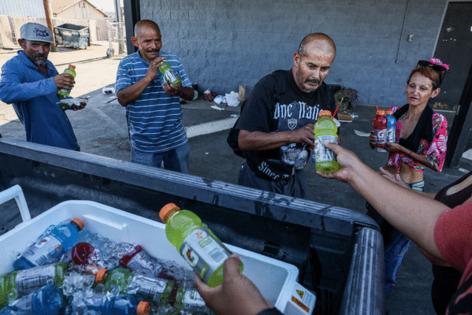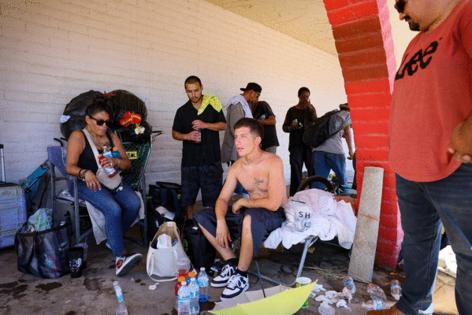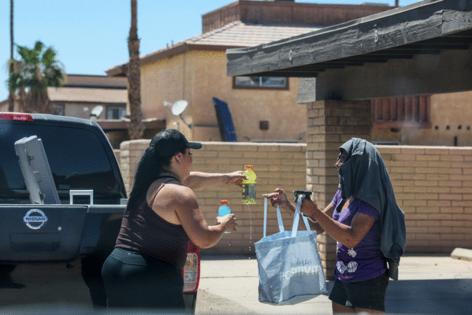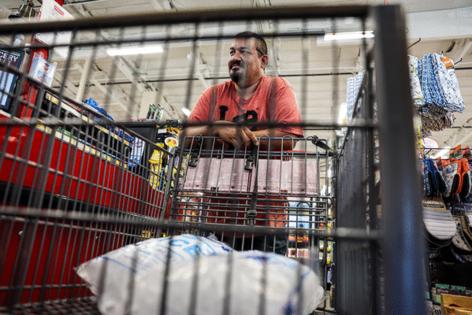Living without documentation or a home in one of California's hottest regions
Published in Lifestyles
LOS ANGELES -- Temperatures were fast approaching 116 degrees as Rubén Partida and his wife, Kimberly, loaded their dusty Nissan Frontier truck with two coolers of water and Gatorades blanketed in ice. As their neighbors prepared to shelter during the hottest part of the day on June 30, the Partidas began their outreach efforts to members of the unhoused community in Brawley, a city of about 25,000 in the heart of California’s agricultural Imperial Valley.
This has been the couple’s reality every weekday from 2 p.m. to 4 p.m. since June, when temperatures began regularly exceeding 100.
In line with broader state and national trends, Imperial County has seen a steady increase in unhoused people, rising from 1,057 in 2022 to 1,303 in 2023 and to 1,508 in 2024. The county’s increase from 2023 to 2024 far outpaces the increases seen statewide, with California seeing an increase of 3% in that period while Imperial County experienced an increase of 15.7%. And in the summer, the increasing population of unhoused people in the region battles life-threatening heat with little to no resources and support.
Rubén Partida is the founder and chief executive of Comité de Acción del Valle (Valley Action Committee), a nonprofit aiming to “educate the community about climate change and the environment of [Imperial] Valley,” according to its website. He started the organization after surviving colon cancer, which his doctors told him was caused by decades of exposure to harmful chemicals and conditions while working in the area’s extensive agricultural sector.
That led to his dedication to educate locals and others about environmental dangers in the Imperial Valley and empower them to speak up. The organization focuses on farmworkers most of the year, but during the summer, it redirects its attention to the unhoused community.
Primarily, that means bringing people water and helping them find places where they can cool off, Partida said. Reaching this community is challenging because to their constant movement in search of cooler areas and attempts to avoid confrontations with local police. The organization patrols areas where unhoused groups — which can range from a few individuals to more than 50 — usually gather, such as alleyways, behind large buildings and parking lots.
When Rubén and Kimberly Partida do find these groups, they use kindness and humor in an effort to disarm initial wariness. Many relax when they see that the couple come bearing ice-cold drinks.
Recent challenges have complicated Comité de Acción del Valle’s work. Intensified Immigration and Customs Enforcement sweeps ordered by the Trump administration, along with local ordinances essentially criminalizing homelessness not just in Brawley but in other Imperial Valley cities including Calexico and El Centro, have made it harder for local unhoused communities to manage life-threatening heat.
Heightened border patrol and local police collaboration have driven unhoused people into even more secluded and risky locations, said Daniela Flores, co-founder and executive director of Imperial Valley Equity and Justice Coalition. “There are fewer [unhoused] people out,” said Flores. “They are scared.”
The coalition has seen heightened police and border patrol presence in areas frequented by unhoused and undocumented populations, such as Calexico’s downtown and El Centro’s Main Street. That probably means current efforts to keep these populations cool during extreme heat — such as public cooling centers or public buildings such as libraries that have air conditioning and welcome any and all — are becoming unviable. “You’re asking people to risk their lives to walk five or six blocks across the city to get to A/C,” said Flores. And that means five or six blocks where they are not exposed only to ICE but also to life-threatening heat.
“Now you see a lot of Border Patrol and ICE on bicycles everywhere,” said Rubén. “People don’t go out anymore.”
As a result, the places where unhoused people in the Imperial Valley used to congregate, such as parks, are now empty. In his efforts to help this population, Rubén has found that they are now often hiding under bridges, in canals and in storm drains, making outreach nearly impossible and also exposing these people to more precarious, hot places.
Flores explains that a portion of this demographic are day laborers, who would usually congregate and stay in certain locations of the city to find work. “Some people are literally living in the streets and going to work, and just getting dropped off back to the streets,” she said. This population, Flores says, has also been a target of increased immigration presence in the region.
On one hot day in June, Rubén encountered one such individual, who asked to be called Rogelio, in a shopping center near El Centro. As Rubén gave him water, Rogelio told The Times that he had no secure form of housing, at times living in a dilapidated camping trailer without air conditioning outside his brother’s home nearby. To earn money, he washes car rims outside a supermarket, working long hours in severe heat.
To get some respite, Rogelio used to sometimes go behind the supermarket, where he could find shade. That was until one day he went behind the building to cool off, passed out and was awakened by a Border Patrol vehicle honking. The agent ultimately drove away, but Rogelio said he now worries even about taking breaks where he used to feel safe.
The intensification of immigration enforcement and criminalization of homelessness has created a perilous situation in Imperial Valley, driving already vulnerable communities deeper into isolation and danger. Despite the challenges of reaching these vulnerable populations, Rubén remains committed, driven by personal experiences of environmental harm and loss.
“That’s why we fight,” he said. “So that others don’t suffer.”
©2025 Los Angeles Times. Visit at latimes.com. Distributed by Tribune Content Agency, LLC.































Comments